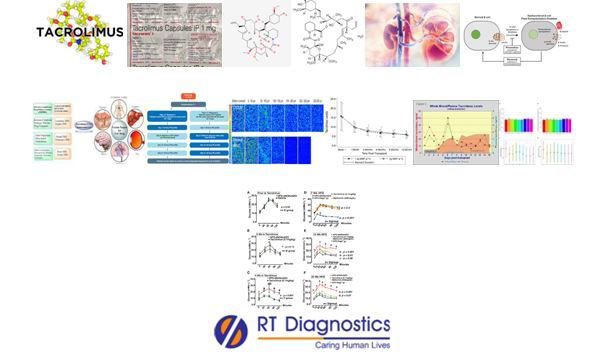Tacrolimus Test:
Why TacrolimusTest ?
CLINICAL INFORMATION
Immunosuppressants are those group of medicines used in transplant surgeries (anti-rejection drugs or immunosuppressant) that lowers the ability of the body to reject a transplanted organ (post-transplant rejection) and in patients with autoimmune disorders (psoriasis, SLE, rheumatoid arthritis, multiple sclerosis, Crohn’s disease - IBD). They usually suppress or reduce the strength of the body’s immune system eg. prednisone (corticosteroids) and/or interleukin inhibitors. There are different classes of immunosuppressant drugs namely calciurineurin (eg. tacrolimus, cyclosporine etc), corticosteroids (prednisone, prednisolone, budesonide etc), Janus kinase inhibitors (tofacitinib), TNF-alpha inhibitors, mTOR inhibitors (sirolimus, everolimusetc), IMDH inhibitors (azathioprine, leflunomide, mycophenolate), biologics (rituximab, infliximab, etanerceptetc), monoclonal antibodies (basiliximab, daclizumabetc), interleukin inhibitors and other selective immuno-suppressants. Symptoms of immunosuppression are frequent and recurrent pneumonia, bronchitis, sinusitis, ear infections, meningitis, skin infection, infection and/or inflammation of internal organs, and blood dyscrasias (anaemia or low platelets), digestive disorders with complaints of loss of appetite, cramps, diarrhoea etc. Tacrolimus (Topical immunomodulator) topical ointment (calcineurin inhibitor class of immunosuppressant drug) is used on the skin to treat moderate to severe atopic dermatitis (abnormal skin condition with itching, redness, inflammation etc), thus it weakens skin defence system, reduces allergic reactions and relieves eczema. The oral formulation is also available. Formulations are in use for immediate and extended-release. Tacrolimus is also used in pathologies related to seborrhoeic dermatitis, oral lichen planus, pruritus ani, facial soriasis, flexural psoriasis, allergic contact dermatitis, balanitis, cutaneous lupus erythematosus, lichen sclerosus, vitiligo, eyelid dermatitis, vesicular hand dermatitis, juvenile plantar dermatosis, keratosis pilaris, paronychia, pyodermagangreosum, rosacea, steroid rosacea etc. This medication should not be taken without the prescription of the physician, since the certain conditions can complicate the pre-existing pathology to worse consequences such as systemic infection, pregnancy, lactation, hypersensitivity to tacrolimus, macrolides like erythromycin, malignancy (premalignant skin lesions), head injuries, patients with electrolyte imbalance, severe liver and kidney diseases, disorders of lymphoid tissue, blood dyscrasias, a child under 2 years, immunocompromised patients etc.
Mechanism of action of tacrolimus – it is a non-steroidal anti-inflammatory agent. Tacrolimus suppresses cell-mediated immunity. Tacrolimus prevents activation of calcineurin phosphate, thus inhibiting dephosphorylation of nuclear factor of activated T-cells and moreover it helps to suppress the activity of genes that code for Il-2. Furthermore, tacrolimus inhibits the transcription of genes which encode Il-3, Il-4, Il-8, GM-CSF, and TNF-alpha (required for activation of T-cells). In hypersensitive patients (sensitive to such allergic reactions) with clinical manifestations of allergy, tacrolimus medication helps in inhibiting the release of mast cells and basophils and also the down-regulates expression of IgE receptors. It exerts an anti-inflammatory effect by reducing the infiltration of inflammatory cells and also by suppressing the expression of pro-inflammatory cytokines etc. Since Tacrolimus has a narrow therapeutic range, the risk of accidental toxicity is high in overdose of Tacrolimus medication. Tacrolimus test aids in screening of Tacrolimus toxicity (accidental poisoning of overdose) and in prognosis (monitoring the narrow therapeutic window). Additional tests include LFT, KFT, imaging studies etc. Other tests CBC, differential count etc.

General Instructions:
Sample Requirement: Specimen - Blood sample collected from the vein. Test Preparation: None.
NOTE - Sample for specimen collections may vary based on the patient’s condition/cases according to the patient’s presenting complaints/signs or symptoms:
SPECIMEN REQUIREMENT (Special or Rare Cases) - As instructed and guided by Physician / Clinician / Pathologist / as per Laboratory’s requirements, according to procedures and protocols.
This Multi-Specialty Clinical Referral Laboratory RT DIAGNOSTICS provides precise and accurate tests with an extensive range of testing services to the medical centres to help in the diagnosis and identification of pathology in the test specimens for infectious diseases and also to evaluate the function of organ systems of the patient. It prevents further complications and helps to stabilize and restore health to near normalcy at the earliest without delay.



